President Museveni rallies Africa to end mother-to-child infections
In a speech delivered by Vice President Jessica Alupo on Monday, July 21, at the official opening of the first-ever African Triple Elimination Conference in Munyonyo, Museveni called on African governments to remain committed to safeguarding maternal and child health
The Vice President Jessica Alupo addressing participants as, US Ambassador William Popp and Health minister Dr Ruth Acheng look on during the opening of Triple Elimination Conference Africa (TECA 2025) at Speke Resort Munyonyo in Kampala on July 21, 2025. (Photo by Francis Emorut)
_________________
President Yoweri Museveni has urged African nations to unite in the fight against the maternal-to-child transmission of HIV, syphilis and hepatitis B, warning that preventable infections continue to threaten newborns despite the availability of effective interventions.
In a speech delivered by Vice President Jessica Alupo on Monday, July 21, at the official opening of the first-ever African Triple Elimination Conference in Munyonyo, Museveni called on African governments to remain committed to safeguarding maternal and child health, even amid shifting global health priorities and reduced donor funding.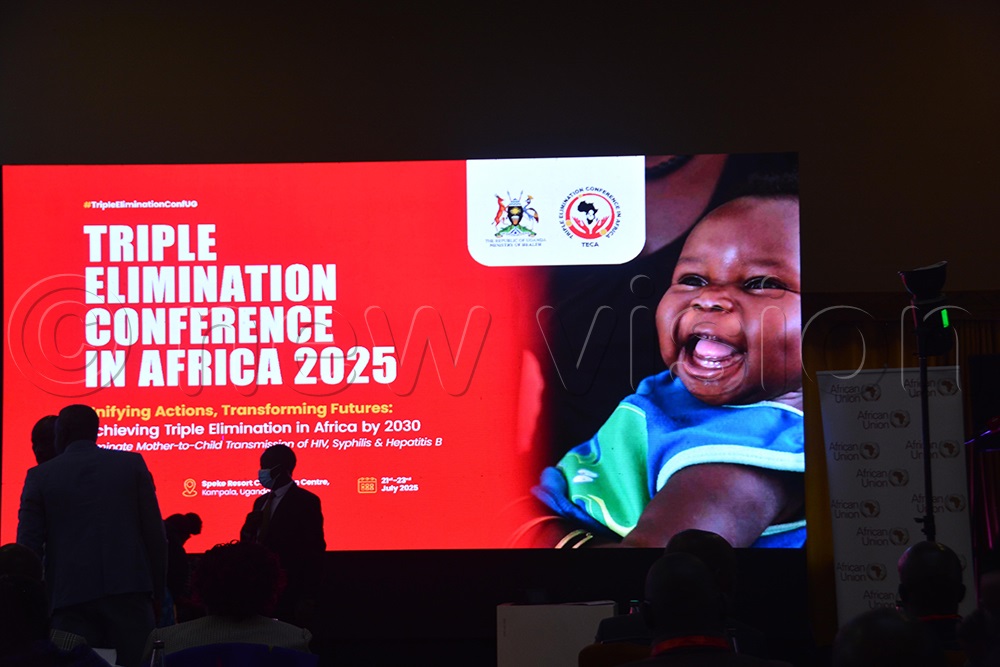
A baby's face on the screen during the Triple Elimination Conference in Africa at Speke Resort Munyonyo on July 21, 2025. (Photo by Francis Emorut)
“The interconnected epidemics of HIV, syphilis and hepatitis B remain a significant burden, particularly through mother-to-child transmission during pregnancy, childbirth and breastfeeding,” Museveni noted. “These infections are preventable, and we already have the knowledge, tools and experience to stop them.”
The president commended Uganda’s progress in reducing HIV infections, attributing this success to early political will and strong partnerships.
“We have reduced new HIV infections from 100,000 in 2004 to 37,000 in 2024, and babies born with HIV have dropped from 90,700 in 2010 to 4,700 in 2021,” he said.
Museveni also used the platform to advocate for increased investment in local vaccine manufacturing, African-led research, innovative financing models, and cross-sectoral partnerships.
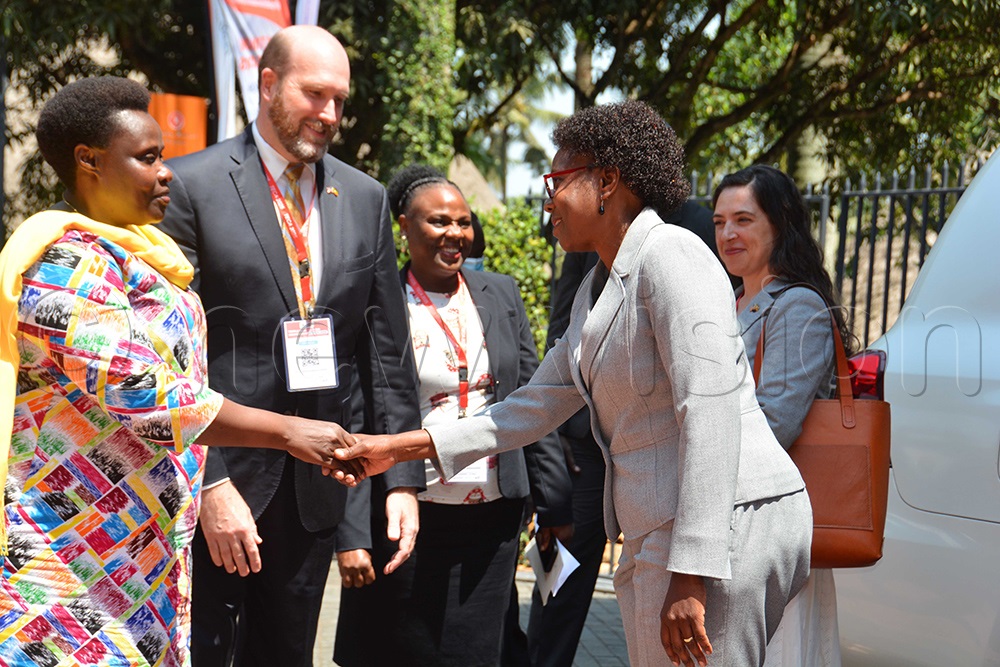
L-R: The Vice President Jessica Alupo, US ambassador William Popp and Health minister Dr Ruth Acheng intercating during the opening of Triple Elimination Conference Africa (TECA 2025) at Speke Resort Munyonyo. (Photo by Francis Emorut)
“We must strengthen health systems by investing in frontline health workers and community-level care,” he said. “Let us not reverse the gains we have fought so hard to achieve.”
The three-day Triple Elimination Conference—the first of its kind both in Africa and globally—drew health leaders, researchers, policymakers and donors from across the continent. The event focused on strategies to eliminate vertical transmission of HIV, syphilis, and hepatitis B/C through integrated maternal and child health services.
Minister of Health Dr Jane Ruth Aceng, whose ministry co-hosted the conference alongside the African Union, Africa CDC, and UN agencies, presented a sobering overview of the current burden.
“Approximately 1.5 million people are living with HIV in Uganda, with 37,000 new infections in 2024 alone. Of these, 13%—or 4,700—resulted from vertical transmission,” Aceng revealed.
She cited findings from the Uganda Population HIV Impact Assessment, which reported that 2.1% of the population had active syphilis infections, while 4.1% of adults and 0.6% of children had evidence of hepatitis C infection.
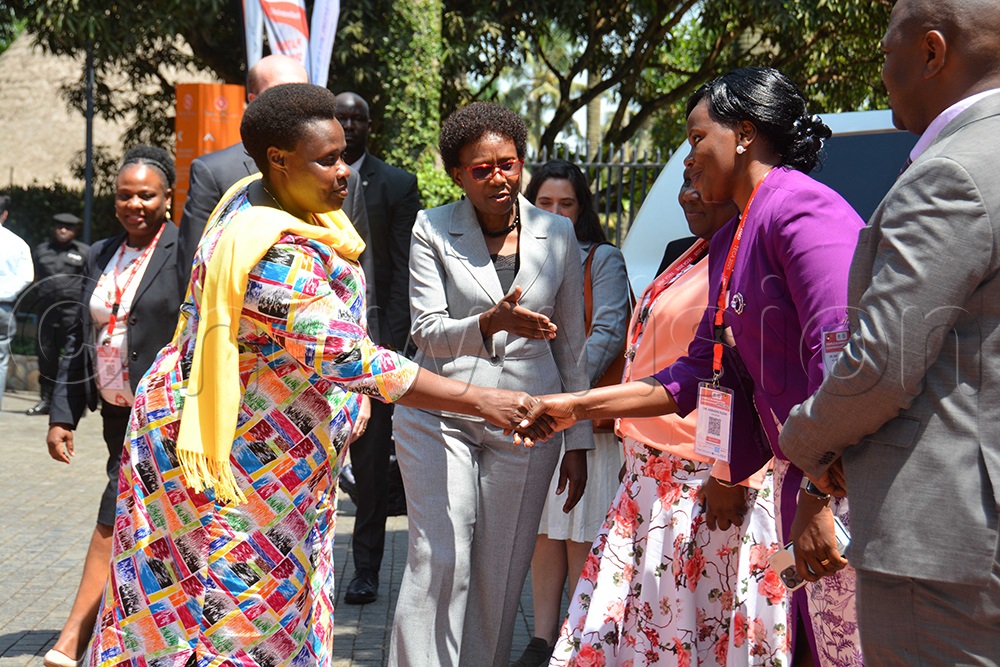
The Vice President Jessica Alupo ( left) interacts with Dr Suzan Nabadda as she is being introduced by the Health minister Dr Ruth Acheng. (Photo by Francis Emorut)
“These infections compromise maternal and child health. Women dropping out of treatment during pregnancy and breastfeeding, and those infected during these periods, account for 80% of vertical transmissions,” she said.
Aceng outlined Uganda’s initiatives under its Triple Elimination Plan (2019–2024), which prioritised the integration of HIV, hepatitis B, and syphilis services into maternal and child health systems.
“Syphilis testing in antenatal care has scaled up from 50% to 94%, and treatment coverage now stands at 83%,” she reported. “Hepatitis B testing among pregnant women has reached 63%, with 42% of those testing positive receiving treatment.”
She said Uganda’s integrated approach—delivering services through maternal, neonatal, and child health platforms—has proven effective and should be adopted more widely across Africa.
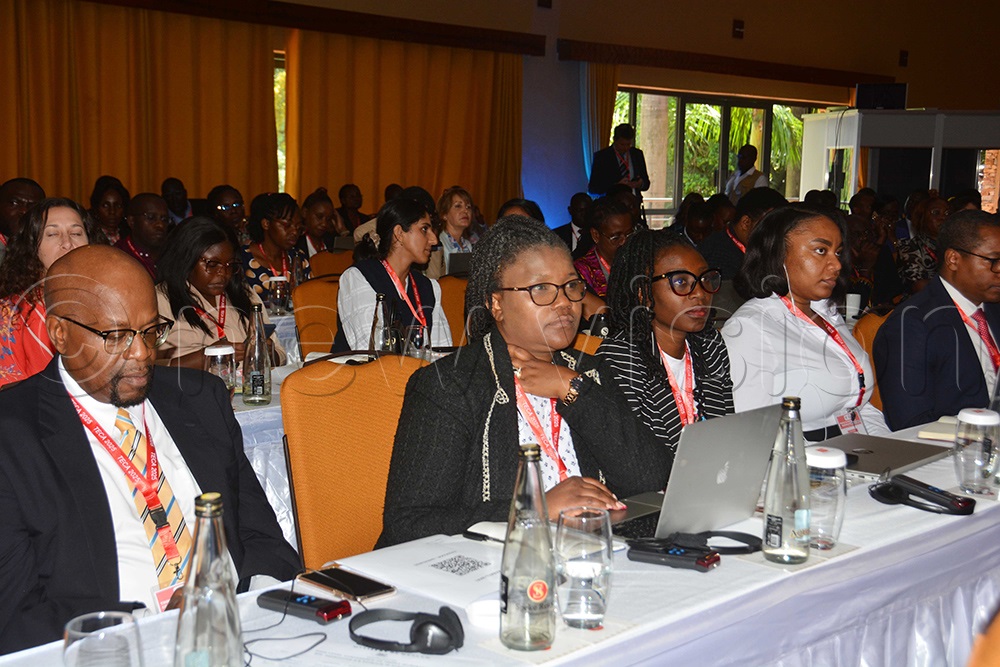
A cross section of delegates during the opening of Triple Elimination Conference Africa (TECA 2025) at Speke Resort Munyonyo in Kampala on July 21, 2025. (Photo by Francis Emorut)
“Integration is the way to go, especially in this era of unprecedented funding challenges,” Aceng said. “We need to bring manufacturing, innovations and research closer to where the disease burden is.”
US Ambassador to Uganda, William Popp, reaffirmed continued American support through PEPFAR, noting that the programme has provided treatment to 1.4 million Ugandans and helped prevent over 2.8 million babies worldwide from acquiring HIV.
“This conference gives us an opportunity to build upon past successes—not only in HIV, but in eliminating other diseases like syphilis and hepatitis B,” Popp said.
However, he cautioned that with new US policy directions and shifting priorities, African nations must work towards long-term sustainability.
Kenneth Kabagambe, executive director of the National Organisation for People Living with Hepatitis B, also stressed the need for domestic leadership. He recalled how Uganda, through strong collaboration between government and civil society, launched mass hepatitis B screening and vaccination drives beginning in 2015.
“We must continue to invest in diagnostics, treatment, and health system strengthening to meet our 2030 goals,” Kabagambe said.
Held under the theme “Unifying Actions, Transforming Futures,” the Triple Elimination Conference brought together health ministers, researchers, donors, and community leaders from across Africa. Its primary goal was to mobilise political will and strategic partnerships to eliminate vertical transmission of HIV, syphilis and hepatitis by 2030.
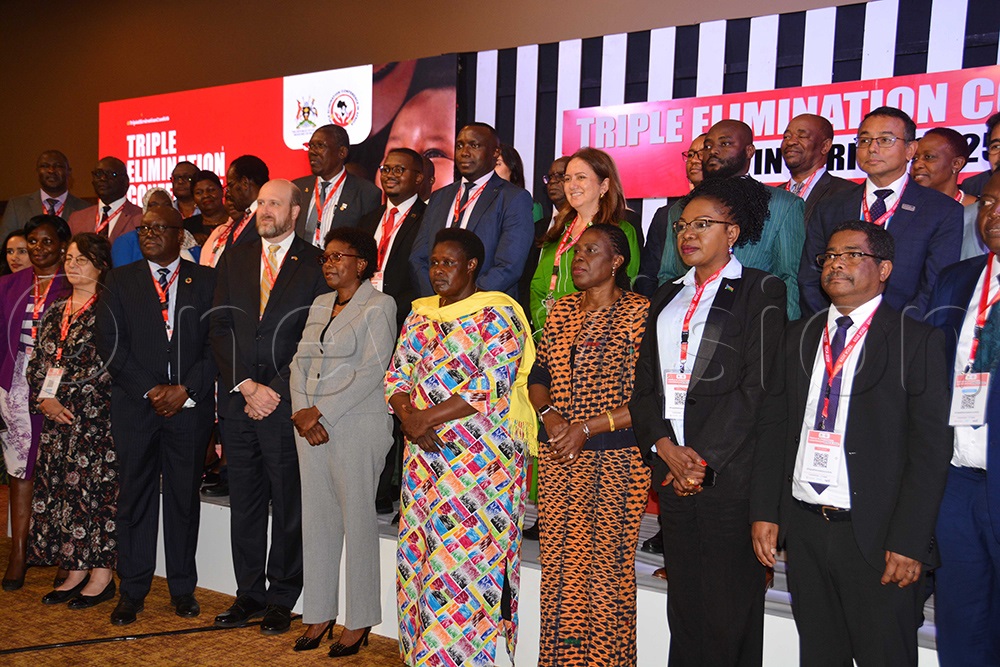
The Vice President Jessica Alupo (with a yellow scarf), Health minister Dr Ruth Acheng (fifth front row), US Ambassador (sixth front row) pose for a group photo with the delegates after the opening of Triple Elimination Conference Africa (TECA 2025) at Speke Resort Munyonyo in Kampala on July 21, 2025. (Photo by Francis Emorut)
Museveni reminded delegates that Africa cannot afford to lose momentum.
“Let us work together as one continent, with one vision, guided by the African Union and the Africa CDC. We owe it to the next generation to deliver a healthier, more resilient future.”